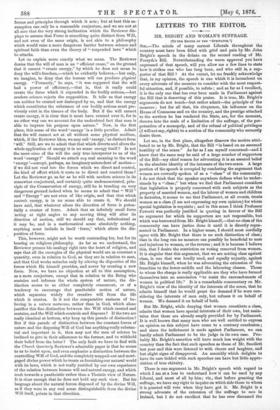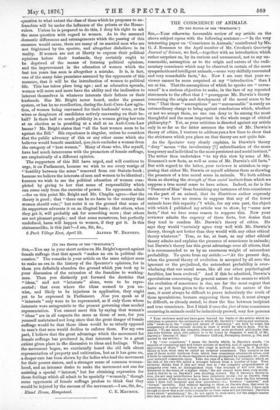LETTERS TO THE EDITOR.
MR. BRIGHT AND WOMAN'S SUFFRAGE.
[TO THB EDITOR OF TUB "SPECTATOR."]
Sin,—The minds of many earnest Liberals throughout the country must have been filled with grief and pain by Mr. John Bright's speech in the debate on the second reading of Mr. Forsyth's Bill. Notwithstanding the warm approval you have expressed of that speech, will you allow me a few lines to state how it strikes one who has long been, and who still is, a sup- porter of that Bill ? At the outset, let me frankly acknowledge that, in my opinion, the speech is one which it is incumbent on every advocate of the measure to consider with the most respect- ful attention, and, if possible, to refute ; and as far as I recollect, it is the only one that has ever been made in Parliament against the Bill that is deserving of this praise. It is true, Mr. Bright's arguments do not touch—but rather admit—the principle of the measure ; but for all that, his eloquence, his influence on the House of Commons and on the country, and the prestige attached to the services he has rendered the State, are, for the moment, thrown into the scale of a limitation of the suffrage, of the per- petuation of a monopoly, and of the refusal of political privileges (I will not say, rights) to a section of the community who earnestly desire them.
Let me, in the first place, altogether disavow the motive attri- buted to us by Mr. Bright, that the Bill "is based on an assumed hostility of the sexes." As far as I am myself concerned—and I know that the same may be said of a large number of supporters of the Bill—my chief reason for advocating it is an assured belief in the absolute identity of the interests of the two sexes. A large portion of the speech is occupied by combating the argument that women are correctly spoken of as a " class " of the community. I do not think that the speaker anywhere defines what he under- stands by a " class ;" but when we find that Parliament considers that legislation is properly concerned with such subjects as the property of married women, and the labour of women and children in factories, it seems to me that Parliament, at all events, treats women as a class (I am not expressing my own opinion) for whom special legislation is requisite ; and in this sense I think Professor Fawcett was perfectly justified in quoting in favour of the Bill an argument for which its supporters are not responsible, but which was borrowed from Mr. Bright himself,—that no class of the community can have justice done it until it is directly repre- sented in Parliament. In a higher sense, I should most cordially agree with Mr. Bright that there is no such distinction of class; that in the long run no measure can possibly be beneficial to men and injurious to women, or the reverse ; and it is because I believe this, that I desire the restriction on voting removed from women. It is singular that this argument, that we are setting class against class, is one that was loudly used, and equally unjustly, against Mr. Bright himself, when he was advocating the extension of the franchise to the lower-middle and the labouring classes. Those to whom the charge is really applicable are they who have formed themselves into an association " to resist the encroachments of women in political life." It is a remarkable commentary on Mr. Bright's view of the identity of the interests of the sexes, that he admits himself that he would grant the demand if he were con- sidering the interests of men only, but refuses it on behalf of women. We demand it on behalf of both.
But Mr. Bright, while denying that women constitute a class, admits that women have special interests of their own, but main- tains that these are already amply provided for by Parliament. It is well known that many men who are well entitled to express an opinion on this subject have come to a contrary conclusion ; and since the indictment is made against Parliament, we can hardly admit Parliament to be the judge in its own case. Pro- bably Mr. Bright's assertion will have much less weight with the country than the fact that such speeches as those of Mr. Smollett last year and this were listened to with cheers and laughter, and but slight signs of disapproval. An assembly which delights to have its ears tickled with such speeches can have but little appre- ciation of true chivalry.
There is one argument in Mr. Bright's speech with regard to which I am at a loss to understand how it can be used by any Liberal, and most of all by him; viz., that before granting the suffrage, we have any right to inquire on which side those to whom it is granted will vote when they have got it. Mr. Bright is a strong advocate of the extension of the suffrage to men in Ireland, but I do not recollect that he has ever discussed the aquestion to what extent the class of them which he proposes to en- franchise will be under the influence of the priests or the Home- rulers. Unless he is prepared to do this, I deny his right to ask the same question with regard to women. As to the assumed -domestic differences and estrangements which the passing of this measure would cause, there are many of us married men who are not frightened by the spectre, and altogether disbelieve in its reality. If women are not at liberty to express their political opinions before their husbands, they certainly ought to be deprived of the means of forming political opinions, and the improvement in the education of women which the last ten years has seen is altogether a mistake. It is, in fact, one of the many false premisses assumed by the opponents of this measure, that it will be the introduction of women to political life. This has taken place long ago ; and as education spreads, women will more and more have the ability and the inclination to Interest themselves in whatever interests their fathers or their husbands. Has Mr. Bright never heard, under the present system, or has he no recollection, during the Anti-Corn-Law agita- tion, of women being canvassed for their husbands' votes, or the wives or daughters of candidates actively canvassing on their be- half? Is there half so much publicity in a woman giving her vote at an election as in presiding at a stall at an Anti-Corn-Law bazaar? Mr. Bright states that "all the best women seem to be against the Bill." His experience is singular, unless he considers that the public advocacy of this or any other cause which she believes would benefit mankind, ipso facto excludes a woman from the category of "best women." Many of those who, like myself, have had much intercourse with the promoters of female suffrage, are emphatically of a different opinion.
The supporters of this Bill have urged, and will continue to urge, it on Parliament, because we wish to see every vestige of " hostility between the sexes " removed from our Statute-book ; because we believe the interests of men and women to be identical ; because we wish to see the political education of woman com- pleted by giving to her that sense of responsibility which can come only from the exercise of power. Its opponents admit —for on this point Mr. Bright and Mr. Chaplin agree—that the theory is good ; that "there can be no harm to the country that women should vote ;" but resist it on the ground that some of its supporters advocate it on an illogical basis ; that others, when they get it, will probably ask for something more ; that others are not pleasant people ; and that some monstrous, but perfectly sindefined, harm will happen to women, if they get it. Is this statesmanlike, is this just ?—I am, Sir, &c.,
6 Park Village East, April 29. ALFRED W. BENNE1T.



































 Previous page
Previous page